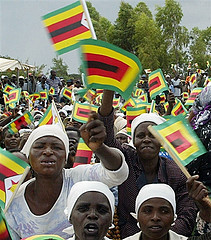
President Robert Mugabe
The following article by Abayomi Azikiwe, editor of Pan-African News Wire, is from Workers World:
Against all odds the southern African nation of Zimbabwe is celebrating its 30th year of independence from British settler-colonialism.
In February and early March of 1980, nationwide elections were held inside the former Rhodesia, named after racist colonialist Cecil Rhodes, in which the two leading national liberation movements, the Zimbabwe African National Union-Patriotic Front and the Zimbabwe African People’s Union-Patriotic Front, won the overwhelming majority of votes leading to the recognition by the international community of an independent state on April 18 of that year.
The elections grew out of a 14-year armed struggle waged by the African majority against the Rhodesian state headed by Prime Minister Ian Smith. After tremendous gains were made in the national liberation war during the late 1970s, the U.S. and British imperialism pressured the Smith regime to negotiate an end to the war.
These talks held in December 1979 resulted in what became known as the Lancaster House Agreements. A ceasefire was declared, and 16,500 guerrillas from the Zimbabwe African National Liberation Army, which was the armed wing of ZANU-PF, and 5,500 fighters from the Zimbabwe African People’s Revolutionary Army, the military section of ZAPU-PF, returned to the country.
 The survival of Zimbabwe as an independent country committed to the empowerment of the African majority as well as an anti-imperialist foreign policy is a testament to the unity and fortitude of the ZANU-PF party, which merged with ZAPU-PF in late 1987. Over the last decade, since the imposition of the Third Chimurenga — a radical land reform policy that seized control of half of the farm land previously controlled by white settlers even after national independence — the Western imperialist states have enacted sanctions against the country and its leadership.
The survival of Zimbabwe as an independent country committed to the empowerment of the African majority as well as an anti-imperialist foreign policy is a testament to the unity and fortitude of the ZANU-PF party, which merged with ZAPU-PF in late 1987. Over the last decade, since the imposition of the Third Chimurenga — a radical land reform policy that seized control of half of the farm land previously controlled by white settlers even after national independence — the Western imperialist states have enacted sanctions against the country and its leadership.
Continue reading →
 The following is from Zimbabwe’s Herald:
The following is from Zimbabwe’s Herald: 


 The following is by Mahmood Mamdani and was posted at the
The following is by Mahmood Mamdani and was posted at the 














